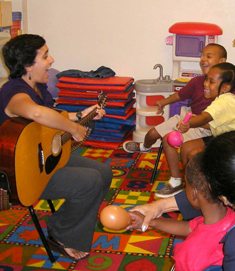Education department introduces music therapy
 (CNS): Government officials have revealed this week that the Ministry of Education, Training and Employment has introduced music therapy to assist individuals with developmental, learning, and other disabilities. Since October 2010, students from the Sunrise Adult Training Centre clients, the Lighthouse School, Early Intervention, and Savannah Primary have participated in weekly music-therapy sessions with Cayman Music Therapy Founder Julianne Parolisi. There are around 150 clients within the government system that are now making music with Parolisi and the ministry hopes to able to expand the therapy to other students in the government system facing behavioural r problems when funds become available.
(CNS): Government officials have revealed this week that the Ministry of Education, Training and Employment has introduced music therapy to assist individuals with developmental, learning, and other disabilities. Since October 2010, students from the Sunrise Adult Training Centre clients, the Lighthouse School, Early Intervention, and Savannah Primary have participated in weekly music-therapy sessions with Cayman Music Therapy Founder Julianne Parolisi. There are around 150 clients within the government system that are now making music with Parolisi and the ministry hopes to able to expand the therapy to other students in the government system facing behavioural r problems when funds become available.
According to the American Music Therapy Association the therapy, which is new to Cayman, is an established healthcare option that uses music to address physical, emotional, cognitive and social needs Music therapy helps strengthen abilities which can be transferred to other aspects of life. It provides avenues for communication that can be helpful to those who otherwise find it difficult to express themselves.
The association further asserts that research supports the effectiveness of music therapy. It is proven to facilitate movement and overall physical rehabilitation, motivate people to cope with treatment, provide emotional support for clients and their families, and provide an outlet to express feelings.
Parolisi said music therapy even improves the quality of life for persons who are well. It also meets the needs of children, teens, adults and elders with challenges, special needs or illnesses. “Because music is a powerful, yet non-threatening medium, unique outcomes are possible,” she said.
“It touches each person in so many different ways, so participation offers significant opportunities for growth, creativity and expression that are less easily achieved through more traditional therapies.”
Her sessions typically include music improvisation and receptive listening, music composition or song writing, lyric discussions, singing or playing familiar songs, group music-making, and music technology projects. During therapy Parolisi also evaluates emotional well-being, physical health, social functioning, communication abilities, and cognitive skills – and all through her clients’ musical responses.
Ministry of Education, Training and Employment’s Senior Policy Advisor for Special Educational Needs Brent Holt said the ministry is excited to have Parolisi onboard.
“Recognising that many children and adults who have special education needs require a broad range of therapeutic services, we were excited when the opportunity to work with Cayman Music Therapy materialised just after the start of the current school year,” he said. “Many of the student and adult participants have difficulty communicating, especially in expressing higher-level emotional needs. Since introducing music therapy, we’ve witnessed improved social behaviour among other excellent results.”
Sunrise Adult Training Centre Director Roberta Gordon added that music has always been a motivator for the group especially for those with little or no verbal ability. “Last year our Christmas concert was phenomenal,” she said. “Clients not only participated but actively planned the event. Some who are normally very quiet have become more confident and verbal after just a few months of therapy.”
The education ministry said it hopes to expand therapy in the coming 2011/12 budget year, to include Alternative Education Services students who have the most challenging emotional and behavioural disorders.
Category: Health

